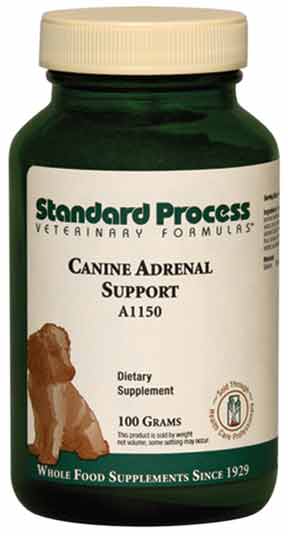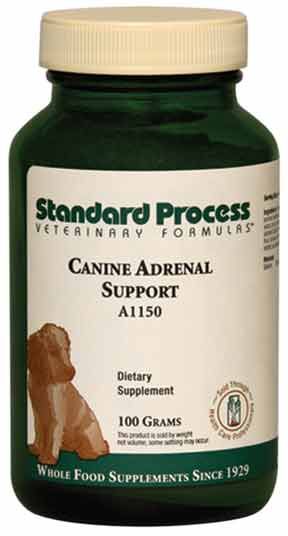[Updated October 11, 2017]
While treatment of Addison’s disease focuses on prescription drugs and electrolyte tests, holistic veterinarians add various support therapies to help their patients.
Standard Process

Nutrition is the cornerstone of every holistic therapy, and while diet cannot cure Addison’s disease, foods made of poor-quality ingredients or diets that lead to nutritional deficiencies are a significant source of stress, and additional stress is just what Addison’s dogs don’t need. Because wheat, corn, and soy are problem ingredients for some dogs, many holistic veterinarians recommend avoiding them. Some tell their clients to avoid grains altogether. In general, foods made from high-quality animal-source ingredients that are easy to digest work best, but because individual responses vary, caregivers should observe their pets’ responses and avoid ingredients that seem to trigger symptoms.
Veterinarians used to recommend adding salt to the food of dogs with Addison’s, but the benefits of the practice are not supported by research. Addison’s dogs do not require additional salt, which may lead to excessive thirst and urination.
The addition of probiotics can improve any dog’s diet, whether home-prepared, raw, cooked, canned, frozen, or packaged. Digestive enzyme powders are a sensible addition for any dog with digestive problems. These products are widely available in pet supply stores and online. Follow label directions.
Prior to the development of synthetic adrenal hormones, Addison’s disease was treated with glandular extracts. Adrenal cortical extracts given orally or injected are still available, though because synthetic versions have so thoroughly replaced them, few veterinarians are familiar with their use. Those who are often prescribe Standard Process Canine Adrenal Support, a powdered supplement that contains animal tissue extracts and other ingredients that support the adrenals. “The goal of Canine Adrenal Support,” explains the manufacturer, “is to help maintain the adrenal glands’ response to metabolic demand, normalize adrenal function, support the body’s ability to handle stress, and promote the adrenal glands’ ability to rebuild and regenerate.” Adrenal glandulars may reduce the amount of medication needed or just help the dog feel better, but their use requires close supervision from a knowledgeable veterinarian.
Some medicinal herbs are known for their effect on the adrenals. Six years ago, the New Zealand Veterinary Journal published a case report by R.H. Jerrett, et al, that examined the effect of whole, natural liquorice (Glycyrrhiza glabra – what we would call licorice) on a dog with Addison’s. The 4-year-old neutered male subject had persistently high potassium levels despite receiving a moderate dose of fludrocortisone. “Financial considerations and the potential for adverse effects made increasing the dose of fludrocortisone undesirable, so liquorice was added to the dog’s diet in hopes that the hyperkalemia would be corrected,” wrote the researchers. The dog’s potassium levels returned to normal, where they remained for the duration of the 14-month study. “Given these very preliminary findings,” the authors concluded, “we believe it is possible that liquorice may, in future, prove to be a useful adjunct in the management of canine hypoadrenocorticism.” It may also prolong the effect of corticosteroids.
Licorice is an adaptogenic herb, a category that describes medicinal plants that help the body deal with stress. Relaxing or sedative herbs help Addison’s patients, too. Oatstraw (Avena sativa) and German chamomile (Matricaria chamomilla) brewed as teas separately or together can be added to food or even applied to the skin and coat to help dogs feel relaxed. Other herbs may be beneficial for gastrointestinal upset and liver support.
Aromatherapy’s essential oils are more concentrated than herbal teas, so they should be diluted with vegetable oils before being applied to the skin, coat, or paw pads. For details see “Aromatherapy for Dogs,” WDJ 2004.
In her book, Holistic Aromatherapy for Animals, Kristen Leigh Bell describes her Calm Canine Essential Oil Blend, made with ½ fluid ounce (1 tablespoon) hazelnut, sweet almond, or other vegetable oil, 3 drops valerian (Valeriana officinalis), 2 drops vetiver (Vetivera zizanoides), 4 drops petitgrain (Citrus auranthium leaf), 3 drops sweet marjoram (Origanum morjorana), and 2 drops sweet orange (Citrus sinensis) essential oils. Combine and store in a dark glass bottle.
“This is my standard calming blend,” says Bell, “which has had a very impressive track record for dogs in numerous situations. The calming effect ranges from ‘taking the edge off’ to soothing a dog to the point where she gets very mellow and takes a nap.”
For best results use therapeutic-quality essential oils. Several pet aromatherapy companies make their own calming sprays and oils.
Melatonin, a hormone produced by the pineal gland, is sold as an over-the-counter supplement to help people with insomnia sleep through the night.
Veterinarians have found that when given to dogs, melatonin helps manage separation anxiety and fearful reactions to thunder, fireworks, and other noises. In other words, it helps reduce stress levels.
Melatonin is recommended (one 3-mg tablet or capsule for a medium-sized dog) 20 to 30 minutes before stressful events. Although some experts warn that melatonin may interfere with corticosteroids and other medications, others consider the benefits of occasional use to outweigh the risks. Consult your veterinarian as to whether melatonin is appropriate for your dog.
Calming pheromones provide stress relief, too. The product Comfort Zone contains “dog appeasing pheromone” (DAP), which may significantly reduce destructive behavior, fears, and phobias and help some dogs deal with stressful environments. Comfort Zone is sold in pet supply stores as a spray or with a plug-in electric diffuser.
Other techniques that help Addison’s dogs include massage, the playing of soft classical music, and energy therapies such as Reiki.







My dogs vet is leaning toward Addisons and need to sched a test to derermine whether or not he has it. Im looking at the sympts and he isn’t & has never been stressed, his appetite has always been really great! And his coat is beautiful and shiny. So Im confused why the vet thinks he has Addisons bcuz he isnt showing these major sympts :/
Coincidently, our vet is suggesting the same thing for our 12 year old chihuahua after we had some blood work done. His potassium and sodium levels prompted the add-on test for addison’s. His score was a 1.5 and normal is between 2 and 6. She wants to take blood, inject cortisol, then take blood after a time to measure his level. Our dog has a good appetite great coat, but he has some of the other symptoms like lethargy and seems stressed. :(. Good luck with your situation!
Chris, My dog is in Addison crisis now and since i never did a test, no vet will treat him unless he has a test which cant be done now he needs immed care. Horrible spot im in! Im ordering this product and im treating my dog at home. all this time i thought he had Chronic Kidney Failure as another vet had suggested. i was in pure denial.
I suggest you do the test for peace of mind before this happens to you. I also treated my dog for whipworms because a whipworm infestation can mimic Addisons on a blood panel. He also had whipworms. omg my baby.. So anyway, just wanted to let you know its nothing to mess with. My dog is slowly recovering though. I learned my lesson not to second guess a professional opinion. It’s also expensive but now i realize so worth it! I refuse to do big pharma and will go the dessicated adrenal support route.. take care!
My dog went into Addison’s crisis too, we thought he had ate something but after taking him to the vet and undergoing a lot of tests, they decided on Addison’s disease. Now he takes a percorten shot one a month and takes prednisone daily. Now i have another dog showing the same symptoms. I don’t have the $800 to take him to the vet though due to corona. So now i am hoping to treat him naturally. good luck to the both of you.
Hi, what is the desiccated adrenal support route? Please let me know. I feel like each episode she has I lose another small piece of her😢😢😮😣
I have a Boston that has been diagnosed with Addison’s. In the past 5
months she’s been hospitalized x4 for lethargy panting, pacing and shaking all night. Then she begins to vomit. She receives .8mg of Zycortal every 29 days. She is also on 2.5 mg of prednisone daily and thyrotab 2x per day. When she goes downhill she goes very quickly. She eats a raw diet. Appetite is always good except when she’s in an Addisonian episode. Then she refuses food. Such a complex disease 😢
I just switched to pills after a couple of years on the vaccine
Hoping this will keep her at a constant stable place she always became extremely anxious at the vet and I thought it wasn’t right to subject her to that terrible thing each month
She’d vibrate terribly m- hope I made the right decision for her🙏🏻